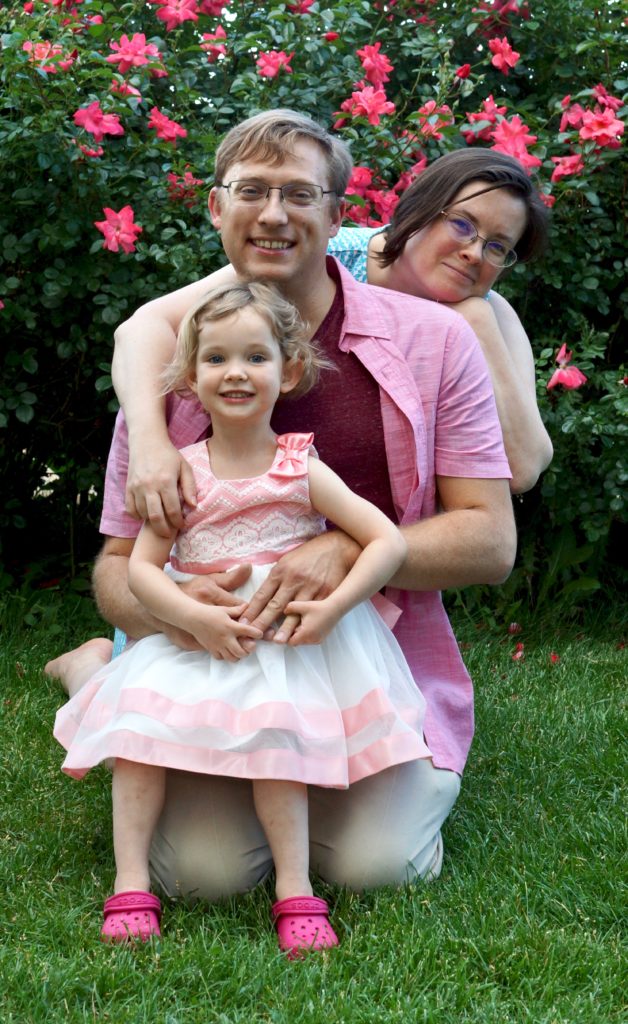Our Stories: Andrew Metzroth
My parents had just announced my mother’s pregnancy to her parents, both devout Catholics. Although both of my parents had been raised in the Catholic faith, they disliked the experience and had moved away from it in their adult lives. Politely, my mother responded, “Well, we haven’t decided yet,” to which, according to family legend, my grandmother snapped, “If you don’t baptise it Catholic, we’re writing you out of the will!”
If you know my mom, you know that you don’t want to get in an argument with her if you can help it. In what I believe was one of the most frighteningly cogent moments in her life, she replied, “Well that settles it. We can’t baptize it Catholic because for the rest of your life you’ll say we only did it for the money.”
And that’s how I became a Unitarian Universalist.
When you’re raised UU, you learn pretty quickly that, unless you happen to live in Massachusetts, you’re going to have to do plenty of explaining what you are to your peers. The name alone, “Unitarian Universalist,” has ten syllables, which outstrips most other faiths handily. For reference, Zoroastrianism has seven. You stand out.
In elementary school my summary amounted to “You can believe what you want, but there are some rules.” When asked, “Do you believe in God?” I got puzzled looks when I said, “I think some of us do.” By middle school, I had refined that view to “We have seven principles that basically say ‘be nice to other people and the environment is worth saving.’ From there, you can find what matters to you.”
But to be honest, explaining my religious faith before I was fourteen was pretty much a parlour trick. If you had asked me what I believed then, I would have said, “I’m not sure,” and changed the subject. High school is where I began to value Unitarian Universalism as core to my identity. As my peers came into their own faiths, I realized the strength of an ethical foundation and cultural education I didn’t even notice forming inside me.
I was able to shrug off bullies because I could empathize that their journey was different than mine. I knew exactly why my Jewish friends kept Kosher during Passover, and that some of the more actively feminist ones put oranges on their Seder plates to welcome marginalized voices. Studying Islam and Hinduism in world history, I quickly grasped the importance of traditions and mythology that seemed wholly foreign to my classmates. When my best friend told me he was gay, I knew that didn’t change anything, and I knew it was important to be his ally against the homophobia in our school.
At the time I didn’t realize it, but the most impressive part of this change was that there wasn’t much change. I didn’t struggle to develop the empathy, knowledge, or self-assurance to handle these moments. They were a part of me, and had always been there. Looking back, I can recognize the value the Ninth Grade Trip, youth cons, a comprehensive sexual education program, and years of Sunday classes and youth group meetings gave to me. Participating in these activities gave me a safe space to find the person I wanted to be. In the moment, though, my Unitarian Universalism was reflexive: I didn’t have to pull out my Seven Principles cheat sheet to get me through complicated moments, I just knew how to be a good person from about 15 years of practice.
Most importantly to me, I had an identity. In high school, some of my Christian classmates learned about the importance of proselytizing and saving their friends. Many attempted to do so by compelling me to convert or constantly inviting me to youth groups, bible studies, and parties at their churches designed to get me in the door. Even without knowing exactly what I believed, I knew that evangelical Christianity wasn’t something that spoke to me. My Unitarian Universalist foundation gave me the strength to say “no” to an endless push of peer pressure, while still being friendly to those who asked me.
In college and early adulthood, it might look like my faith took a back seat. I stopped attending church for over a decade, as my time got sucked into the gaping maw of theatre and the performing arts. But my UU toolkit was still hugely important: you can’t tell a story well if you don’t know how to find the humanity in it. Because of my belief in the importance of understanding myself and others, I double-majored in Theatre and Religious Studies. And I also sneaked my faith in by dating and eventually marrying another lifelong UU.
More than anything else, what I’ve learned as a Unitarian Universalist is to practice respect, love and patience; to value everyone on their own terms; and to value every possible experience as a learning opportunity. I’ve also learned it’s more important to explain myself to the world than to explain my faith. I want to keep growing by participating, learning, and making myself uncomfortable so I can find out why I’m uncomfortable.
This Fellowship is a big part of that, although the statement, “I don’t go to church because it’s easy” is near and dear to my heart. When my wife and I decided to start attending the Fellowship regularly, my own spiritual health wasn’t the motivating factor. My daughter’s was. This tradition was so good to me I couldn’t imagine not sharing it with her. My own growth was peripheral, but I’m glad to say that the safe space is still here, and still helping me understand how to live in this world.

